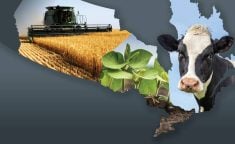Members of the parliamentary Standing Committee on Agriculture and Agri-Food heard from industry leaders May 15 about the challenges brought on by the Canadian Emergency Response Benefit (CERB).
CERB is available to Canadians who have stopped working because of COVID-19 and provides temporary income support of $500 a week for up to 16 weeks.
Ron Lemaire, president of the Canadian Produce Marketing Association, told MPs that accessing domestic labour continues to be a challenge for his industry and the CERB is not helping.
Read Also

Mazergroup’s Bob Mazer dies
Mazergroup’s Bob Mazer, who helped grow his family’s company into a string of farm equipment dealerships and the main dealer for New Holland machinery in Saskatchewan and Manitoba, died July 6 from cancer.
“The CERB has created unintended consequences in the short term for many packers, distributors, wholesalers and small retailers who are facing greater challenges to hire at a time when Canadians are relying on them to provide the food they need,” he said.
Lemaire said the benefit should be adjusted to continue supporting unemployed workers, but should not create a disincentive for Canadian workers. He suggested the $1,000 in allowable income under CERB is too low.
He also made a case for secured credit, or a deemed trust, to be made available to support the industry in instances where a buyer goes bankrupt, because there are currently no federal supports protecting his members from that. Two parliamentary committees have previously recommended the creation of such a program.
Carla Ventin, senior vice-president of Food & Consumer Products of Canada, said cost uncertainties are jeopardizing the future of the agri-food industry. She warned MPs that more than 50 per cent of her members experienced a 25 per cent reduction in productivity due to pandemic mitigation efforts. Meanwhile, 75 per cent of members saw their inputs cost increase – or in some cases, skyrocket – as a result of COVID-19.
She joined Lemaire in criticizing CERB, citing the 10,000 job vacancies existing in the sector prior to the pandemic.
“CERB has had an adverse impact on members’ ability to fill positions,” she said, adding she also wants more incentives to encourage workers in the sector.
She said the $3-billion “wage top-up” funding from Ottawa being made available to workers in essential services is helpful, but more support is needed.
Provinces are contributing an additional $1 billion to the program, and are responsible for deciding what workers qualify for the top-up.
“We also urge the federal government to encourage the provinces to include our industry,” Ventin said.
“What we would like to see, and I think the government is on the right track, is to provide the wage top-up, so to incentivize people in our industry.”
Ventin also called for a $29-million tax credit to be made available to help job training and the development of a manufacturing strategy in partnership with industry and the provinces.
Pickle manufacturer Whyte’s Foods Inc. president Elisabeth Kawaja says her company has inventory planned for restaurants going to waste and they lack the manpower or resources to process incoming crops, which could result in grocery stores not being stocked with their products.
“We are facing staggering wage increases to combat current unemployment subsidies,” she said.
Kawaja and Ventin also took aim at the government’s $77.5 million being available to processors for the purchase of personal protective equipment and other pandemic mitigation measures.
“We are really concerned that the $77.5 million will not even cover the costs already incurred by the primary meat processors,” said Ventin.
Kawaja said her company has bought as much personal protective equipment as possible and slowed production at its plants to maintain social distancing, but said that effort is “costly and time consuming.”
“The risk of the virus hitting our plant and us having to shut our doors… are very real,” she said.




















